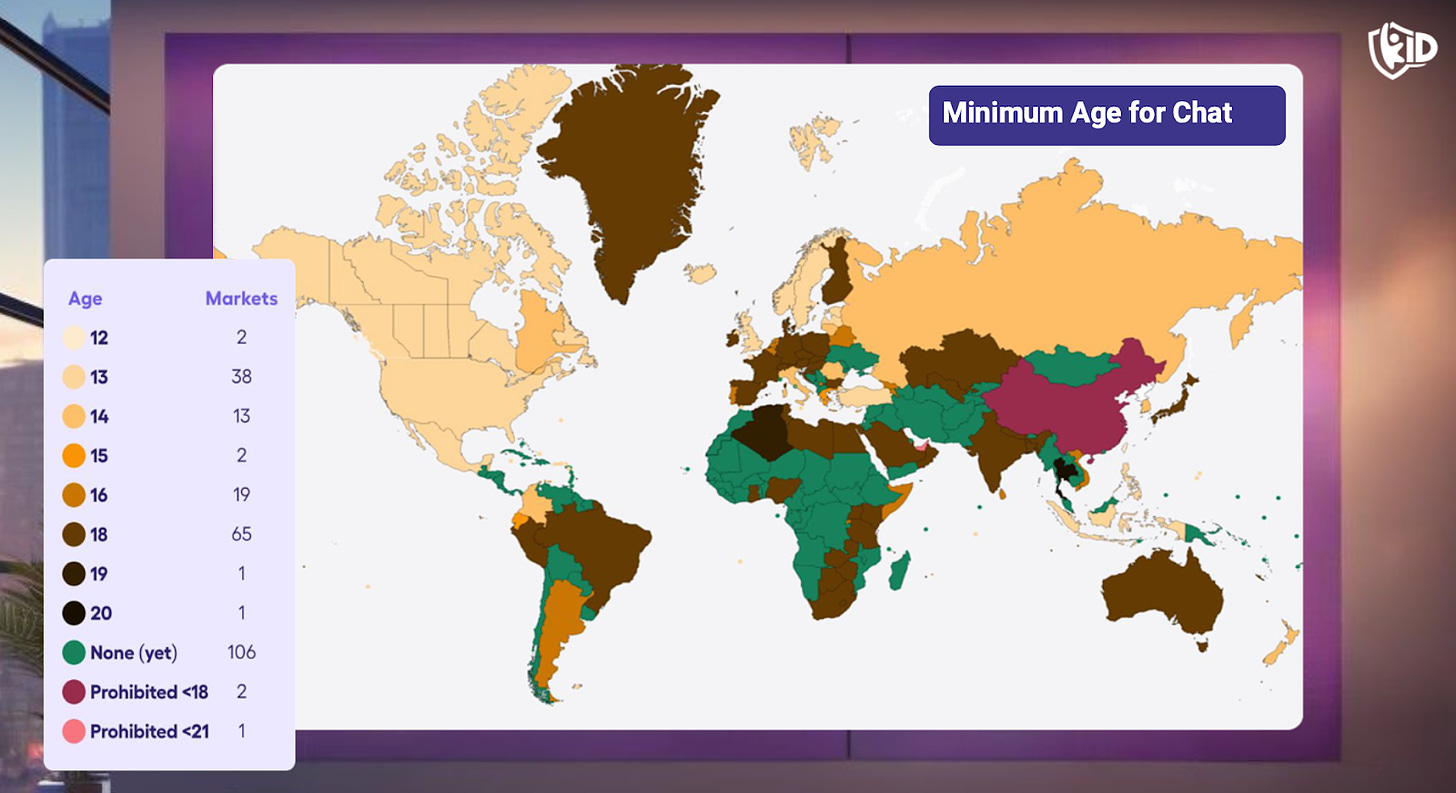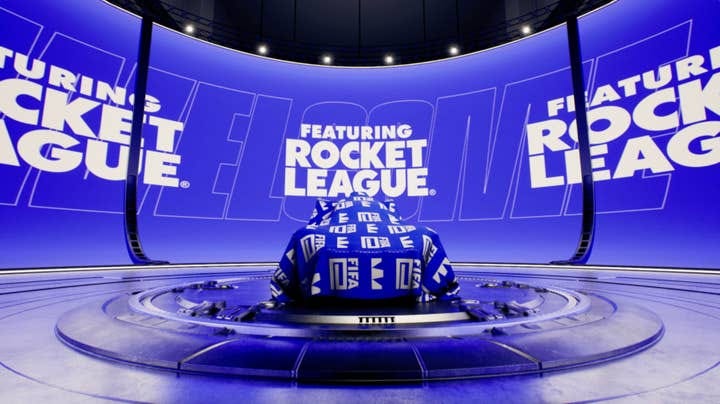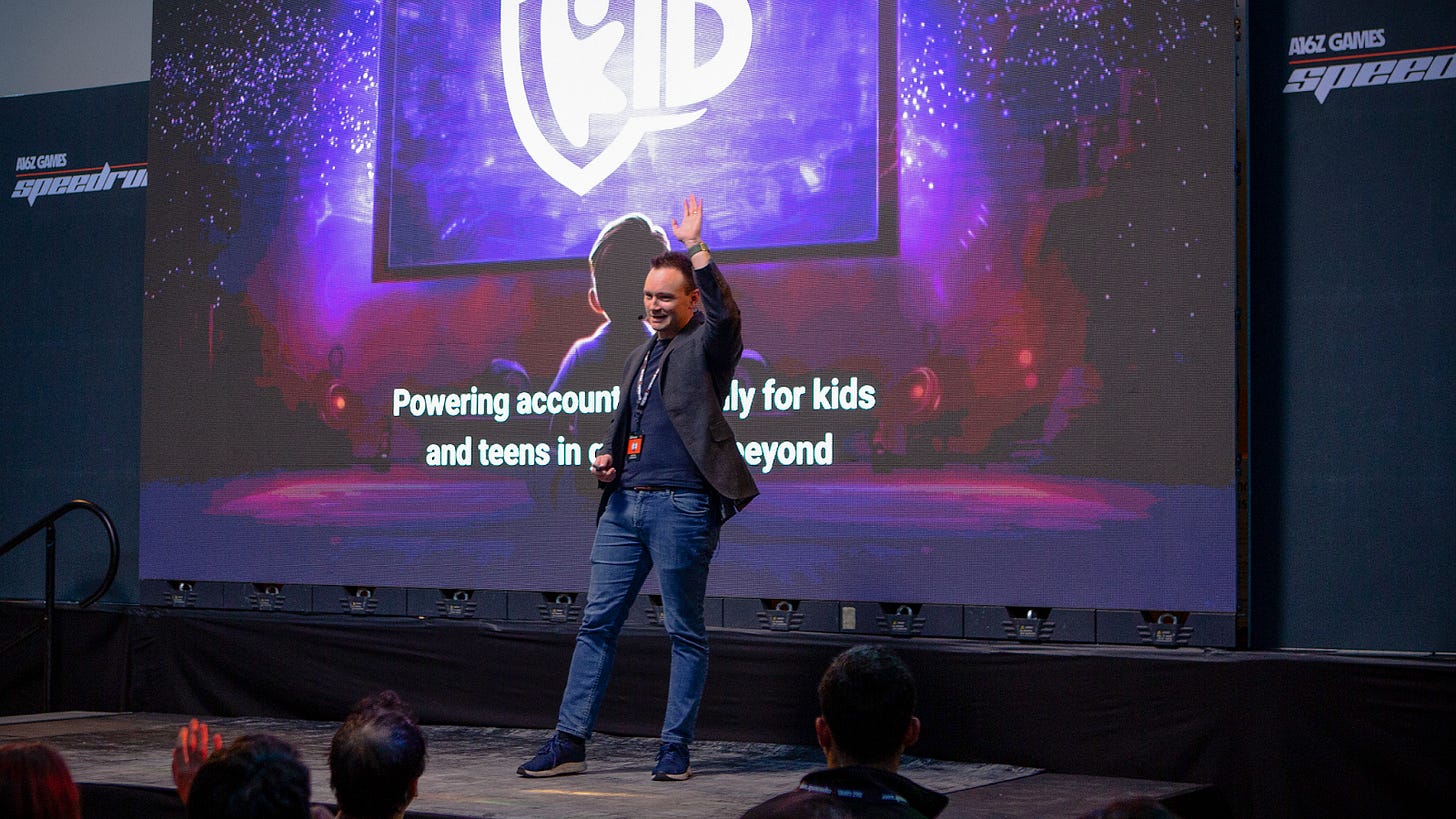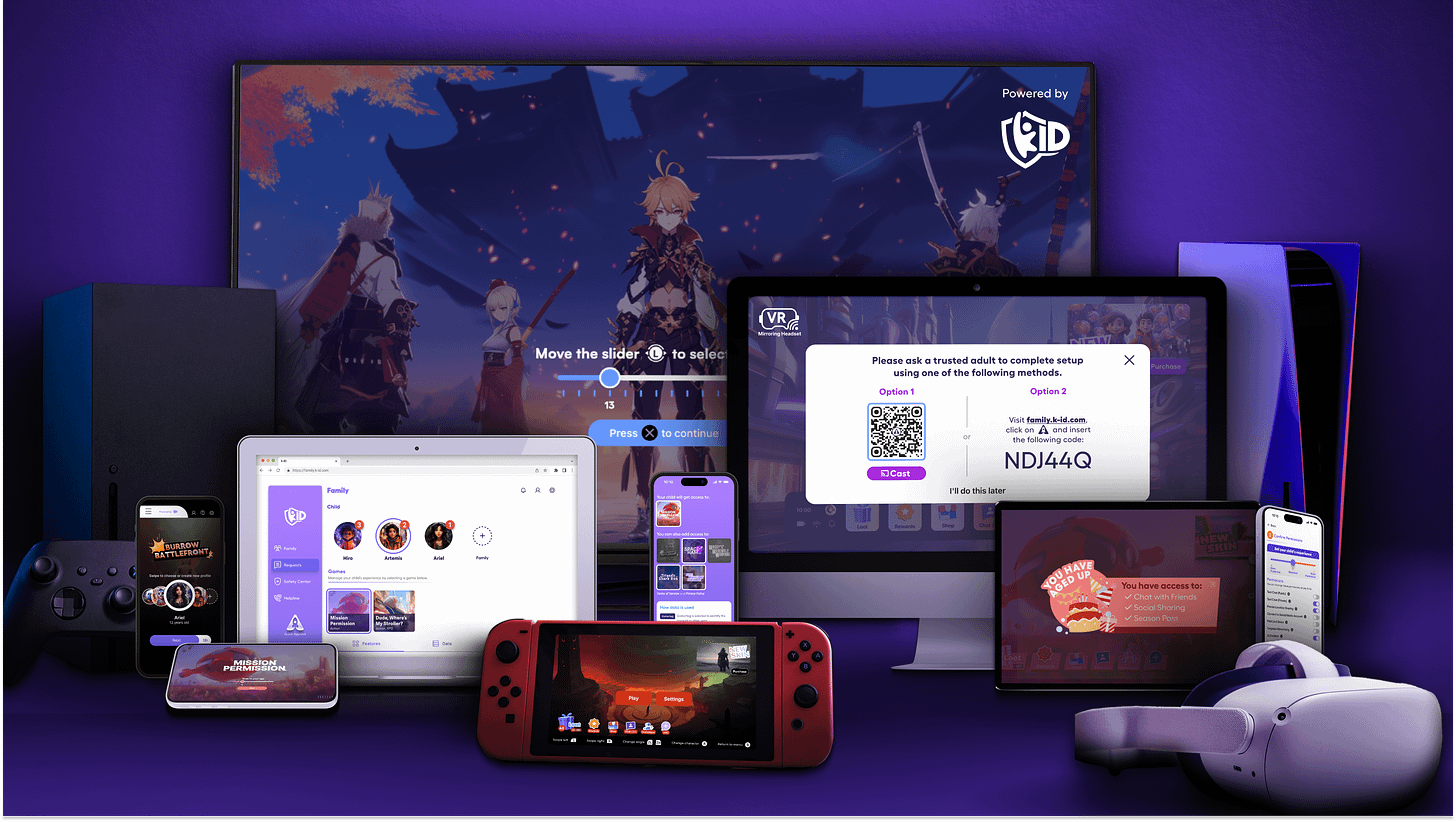Keeping Kids Safe Online with k-ID’s Kieran Donovan
Read our conversation with k-ID CEO and Co-Founder Kieran Donovan
Today A16Z GAMES announced our investment in the Series A round for k-ID.
We first led the Pre-seed in k-ID via our Tech x Games accelerator, SPEEDRUN, invested further in the Seed, and are excited to triple down and join the board in the Series A round.
We’re so excited about k-ID because it solves two burning needs at once:
For developers: it’s an engine that developers can plug into to adapt their content by user age and geography, helping them stay compliant with complex and evolving regulations for digital youth safety around the world
For parents/kids: it’s a friction-less, instant sign-on solution that enables kids and teens to onboard into a safe environment tailored for them, while also providing parents with a hub where they can monitor their kids’ digital time
Our conversation with k-ID CEO and Co-Founder Kieran Donovan below.
First, this week’s most futuristic news links:
News From the Future
⚽ FIFA Announces World Cup event for Rocket League (GamesIndustry.biz)
FIFA revealed the new partnership—which will see 16 national teams compete—during the Rocket League Championship Series on Sunday. The announcement comes as a surprise for Rocket League fans, as country-based competitions are uncommon across esports. Most international tournaments tend to feature private teams.
💍 Metacritic: Elden Ring Expansion is Highest-Rated DLC Ever (VGC)
With an average critic score of 95 out of 100, Shadow of the Erdtree broken records to become the most critically acclaimed DLC ever, according to Metacritic. Previous holders of the title, Witcher 3: Blood and Wine developers CD PROJEKT RED, took to X to congratulate FromSoftware on the new expansion’s success.
⚔️ Supercell Announces Project R.I.S.E. (YouTube)
Fresh off the launch of its latest hit, Squad Busters, Supercell surprised players with an announcement that playtesting would soon begin on a new “Social Action RPG Roguelite” built from the ashes of cancelled project Clash Heroes.
🍎 Crash Bandicoot N. Sane Trilogy Sells 20 Million Copies (Game Developer)
Originally released in 2019, the N. Sane Trilogy is now likely the best-selling Crash game across the character's nearly 30-year history, and is a testament to the power older and near-forgotten game IPs can hold. With series developer Toys for Bob recently having gone independent, we’re curious about the future of the Crash series.
Keeping Kids Safe Online with k-ID’s Kieran Donovan
January 1st, 1900. That’s the date millions of kids put in as their birthday when encountering many current “state of the art” age verification systems online.
These obviously flawed warning pop-ups are sometimes called “age gates,” and for the most part they run on the honor system. Everyone who’s ever had to fill out one of these forms implicitly understands that they’re a joke.
But regulators aren’t laughing.
Last September, Ireland's Data Protection Commissioner fined TikTok €345 million for violating various EU privacy laws designed to protect kids’ privacy. Similar enforcement actions are occurring around the world. In the United States, Google was fined $175 million in 2019 for violations of the Children’s Online Privacy Protection Act (COPPA) and in 2022 Epic Games was fined a record $275 million for its own COPPA violation.
Over 135 data privacy and safety laws—many with widely-varying rules—have been passed globally, and billions in fines have been levied against tech and gaming companies.
The old age-gates are no longer good enough to avoid the risk of serious compliance violations, and game developers, publishers, and platform holders are quickly realizing the need for better tools to abide by the world’s many online youth safety laws. At the same time, parents are becoming increasingly desperate for tools they can use to keep their kids safe online.
Into this gap steps k-ID and Kieran Donovan.
A Worldwide Challenge

In his 14 years as an attorney, Kieran Donovan has circled the globe—and more than a few times.
After a four-year stint writing screenplays in New York, the Australia native started his legal career in Sydney, then practiced in London for a few years before moving to Hong Kong to set up an APAC-focused technology, media, and data practice for the law firm Latham & Watkins.
“A big part of that job,” Donovan says, “was being boots on the ground for big technology companies who were headquartered in the region, who were launching global products online. A lot of it was in gaming, and social, and adjacent things like e-commerce.”
Donovan found himself fascinated by the challenges associated with launching games in dozens of countries at once. “If you’re launching a global game you have to be sensitive to certain content rules in local markets,” he says. “Maybe loot boxes are regulated differently, or the way chat needs to be calibrated is different. And that was my life. So I did that for a huge number of publishers over the course of the journey.”
A couple of years ago, Donovan says, publishers started calling him up and asking him about “the kids issue.” By this, they were referring to the vast wave of legislation being passed—and penalties being levied—against publishers and platforms that failed to comply with various local data privacy laws and regulations designed to protect kids online. Few companies knew how to make sense of the different guidelines on a country-by-country basis, and the severity of enforcement measures being taken kept increasing.
“You put those two things together,” says Donovan, “and the fact that most games just have a pop up that says ‘I confirm I’m over the age of 13’ and you can see that there’s that perfect storm and somebody was gonna have to solve it—there was this opportunity to build out a platform for the industry at large.”
At the core of k-ID’s system is a data pipeline that stores online data for parents, not kids. “Single sign on for kids is instant and safe if the parent is the conduit,” Donovan says. “We deliberately designed it so it’s data-minimized, and for kids it’s data-zero. We don’t keep any data as it relates to kids. It’s all through the parents.”
A Solution Takes Shape
The way “the kids issue” is solved for today, says Donovan, is extremely fragmented. “It’s very siloed, in terms of the ways the different games, or publishers, or all the different platforms try to address the issues,” he says. And it’s not just difficult for game-makers, but for parents as well.
Donovan began putting together a plan for a cross-platform solution to address the issues, and quickly realized that the opportunity was bigger than he’d realized. “What I didn’t realize at first was that it opened up all these opportunities that no one had ever tried to solve, like single-sign-on for kids,” he says. “SSO for kids is not a technology problem, it’s a compliance and safety problem. So if you solve those, then you can do it.”
After putting together his pitch, Donovan hit the road, talking first with some friends in the regulatory space, “including some who’d enforced the law or written the law, to soundboard whether they felt it was something that from a regulatory perspective would see support.” With their buy-in, he felt confident enough to start building the technology and getting feedback on it from the publishers who’d approached him about the challenges they were facing.
I realized we needed someone who was very big on trust and safety,” Donovan says, so he brought on Jeff Wu who helped build the very first trust and safety teams at both Google and Facebook. “We also needed someone with publishing experience with games studios. That’s Julian Corbett. And then Timothy Ma, who has been with me on the k-ID journey from the very beginning. He is a world-renowned expert on children’s privacy and was previously the data protection lead for Tencent. So it’s like we were bringing those Avengers together to tackle the Venn diagram of problems for kids, parents, and platforms.”
The end-result for parents: a single-sign-on solution that keeps your games compliant and keeps your kids safe. With k-ID’s Family Portal, parents have access to a hub where they can manage permissions, oversee in-game spend, set curfews, and monitor playtime.
For developers, publishers, and platform holders, k-ID’s “compliance engine” is just as valuable. “When a publisher is looking at this kids issue,” Donovan says, “they’re thinking ‘how do I onboard kids, and get parental consent, and deal with permissioning.’ They’re dealing with the risk associated with regulation. And so ultimately they’re trying to figure out ‘how do I de-risk this. I don’t want to get hit with a $5 billion penalty.’ Our technology solves for the compliance piece. It’s the certification wrapper that we have around it that de-risks everything. Use the technology and you’re off the hook.”
What’s Next for k-ID
In order to become the true standard for parents and platforms, k-ID’s goal now is to establish itself as the preferred, industry standard sign-on solution across gaming and beyond. “In order to deliver on that, you have to be integrated with a whole variety of layers in the stack, from the game itself, to the publisher account system, to the platform,” Donovan says, “so we’re working very hard to integrate in a meaningful way at all of those levels.”
Already, the company has made strides toward this goal. The k-ID platform has garnered accolades and certifications from youth-focused industry groups including the ESRB Privacy Certified, Age Check Certification Scheme (ACCS), and UNICEF. Top publishers and devs are hopping on board as well—the k-ID team says to expect some of those partnerships to be announced soon.
💼 Jobs Jobs Jobs
There are currently 100+ startups with open jobs listings across our portfolio. For the freshest games industry jobs postings, be sure to follow our own Caitlin Cooke and Jordan Mazer on LinkedIn.
Join our talent network for more opportunities. If we see a fit for you, we'll intro you to relevant founders in the portfolio.











Where can I buy a apparel for your company?